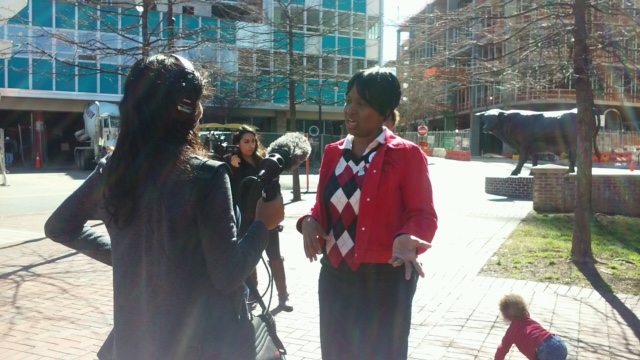By Tara Romano, NC Women’s United
At this past month’s Women’s Advocacy Day (WAD), approximately 200 women (and some men) from across the state came to Raleigh to learn about >>numerous policy issues being debated at the North Carolina General Assembly this legislative session. And not just any issues, but issues that directly and/or uniquely impact women and families in North Carolina. Of course that covers the issues people think of as “traditional women’s issues” – reproductive rights, sexual and domestic violence, early education and affordable, quality childcare. North Carolina Women United (NCWU), the coalition that coordinated this Advocacy Day, didn’t stop there, though.
Economic security, such as access to paid sick and family leave, reinstating the Earned Income Tax Credit, and raising the minimum wage, were also on the agenda; 40% of working women in North Carolina are their family’s primary breadwinner, and an even higher number contribute substantially to their families’ economic security. Protecting civil rights, including LGBTQ and immigrant rights, were also on the agenda; because homophobic and xenophobic policies leaves some women and their families vulnerable to violence and separation. Police accountability was on the agenda; because aggressive policing in communities of color is having a profound and devastating impact on families, and women are also sometimes the victims of police brutality. Access to healthcare was on the agenda; not just because women tend to need access to health care more throughout their lives, but also because of their traditional role as primary caregiver to ill family members. Fair tax reform was on the agenda; because women-headed households are more likely to live in poverty than any other family type, and more likely to need access to critical social safety net services provided for by tax dollars. And voting rights was on the agenda; both because women tend to vote in higher numbers than men, but also because women – and in particular, women of color – are also more likely to be impacted by voting restrictions. And with so many issues impacting women in unique ways, and women still underrepresented in our General Assembly, women need to bring their voices to both the ballot box and the halls of the legislature.
NCWU has been holding WAD for many years now, and this year was one of our biggest turnouts yet! We know there were many participants who were new to advocacy, and our event – with its Advocacy 101 training and issue expert speakers – is designed to make it easy for those first-time citizen advocates. We know it can be intimidating if you’ve never reached out to your elected representatives before, or are unsure who they even are. But newcomers to advocacy are in good company – there has been a recent surge in citizens wanting to get involved in policy discussions at the local, state and federal level. And we believe our democracy is the stronger for it. If you attended WAD last week, thank you! We look forward to seeing you, and the others you bring with you, in the public square.
And we look forward to your continued advocacy! While the NCGA is still in session, follow the bills that are important to you, and make your plan to bring your voice to the policy debate. There are many ways to do this. You can follow a bill’s progress on the >>NCGA website , and reach out to your representatives when it comes time for a House or Senate vote. Or you can start when a bill goes to a committee, before it comes up for a floor vote. If your representative is on the committee, go ahead and contact them to talk about why the bill is important to you, and why you think it should (or shouldn’t) come up for a vote. If your representative is not on the committee, it’s okay to call the chair of the committee to discuss a bill; anyone in a leadership position is accountable to a larger group of constituents than just their district.
You could also set up a regular time to contact your representatives (weekly, etc) to talk to them about any particular policy concerns you have, or needs you see in your district. Developing a relationship with your elected representatives is a great way to stay engaged. And while all of these actions can be done on your own, advocacy is always more fun with a group! Set up a date to visit your representative with other friends in your district. Or host a party to write letters and postcards, or to raise awareness about a local issue with your neighbors and co-workers. Contributing letters-to-the editor on issues you care about will also have an impact on both lawmakers and your fellow citizens.
As NCWU is as >>coalition of organizations , we also recommend connecting with a particular organization that does work meaningful to you. They will have opportunities for you to engage in specific advocacy, as well as ways to volunteer.
And remember, citizen advocacy is a lifelong endeavor, so keep the big picture in mind at times when it feels like your efforts aren’t having an impact. The first step is always the most difficult – now that you’ve started your advocacy, you’ll soon develop the skills and knowledge to make a difference in public policy, and in your community.


There are no comments
Add yours